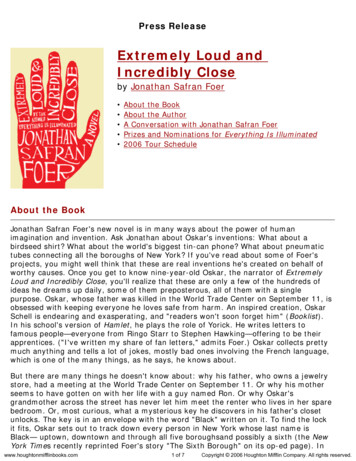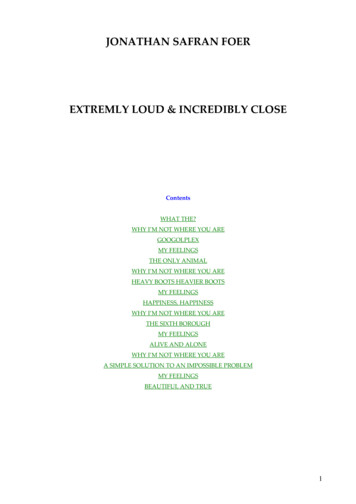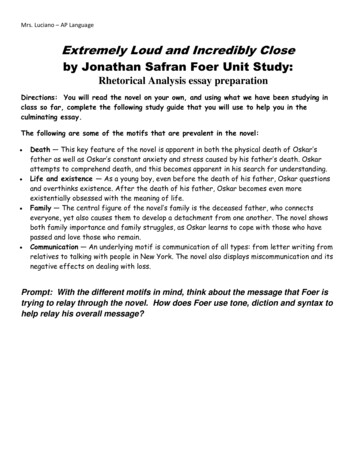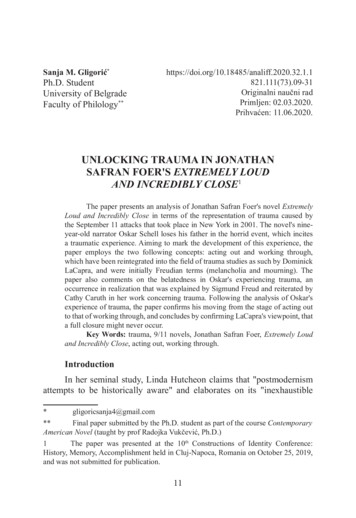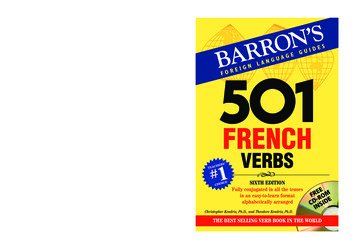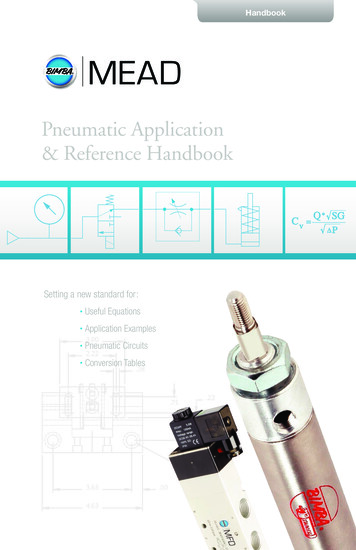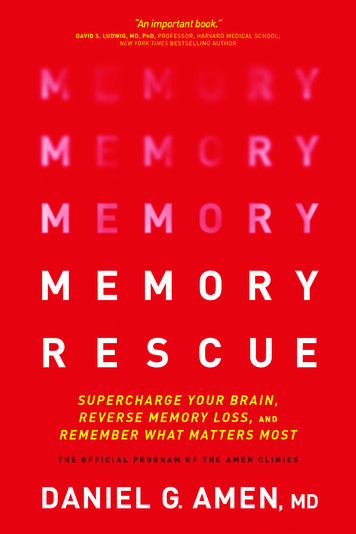
Transcription
This is an incredibly helpful book for anyone who wants to increase theirbrain capacity and strengthen their memory. I want to stay sharp, and that’swhy I read everything Dr. Amen writes, and you should too!PASTOR RICK WARRENAuthor of The Purpose Driven Life and The Daniel PlanRescue your memory with Dr. Amen’s embraced habits that will brightenyour mind.MEHMET OZ, MDProfessor of surgery, New York- Presbyterian/Columbia University Medical CenterMemory Rescue is such an important book if you want to strengthen andkeep your memory strong for the rest of your life. Millions of people findthemselves victims of memory loss and have no idea that there are simpleinterventions to help keep their memory strong. I deeply believe thisapproach can help you or your loved ones.TONY ROBBINS#1 New York Times bestselling author, philanthropist, and the nation’s #1 life andbusiness strategistWhile there’s no pharmaceutical fix for memory decline, research nowvalidates the powerfully therapeutic role of lifestyle choices in recoveringand preserving memory. Dr. Amen’s Memory Rescue eloquently embracesthis science and presents it to the reader in a wonderfully user- friendlyformat.DAVID PERLMUTTER, MD, FACNAuthor of the New York Times #1 bestsellers Grain Brain and The Grain Brain WholeLife PlanMemory Rescue is a powerful new book that shows you step- by- step how toimprove your memory and overall health. The information is smart, simple, research- based, and effective. It’s your road map to the best brain possible.MARK HYMAN, MDPhysician and bestselling authorThis is an insanely simple guide for preventing and possibly reversingmemory loss and dementia, based on Dr. Amen’s 25- plus years of clinicalexperience treating thousands of brain- injured patients. Memory Rescueis a must- read, not only for patients fearful of memory loss, but also
iiMEMORY RESCUEfor physicians who too often take a fatalistic approach to this epidemic.Dr. Amen provides scientifically based measures that can prevent or slowdementia. This book is the most current and succinct source to date on“how to do it.”JOSEPH MAROON, MDClinical professor and vice chairman, Department of Neurosurgery, Universityof Pittsburgh Medical Center; team neurosurgeon, the Pittsburgh SteelersDr. Amen’s work continues to break ground. All cultures put great value inliving a long life, but what if we can’t take our memories with us? Now wehave a choice. The sage wisdom and scientific advances taught in this bookare the secret to living a long, healthy, and fulfilling life.PEDRAM SHOJAI, OMDFounder of Well.org; New York Times bestselling author of The Urban MonkDementia with aging is the sad new normal, but it is neither natural nor inevitable— if you follow Dr. Amen’s brilliant guidance. Keeping and evenimproving your brain is really quite simple: Get nutrients in; keep toxinsout; and use it or lose it.JOSEPH PIZZORNO, NDAuthor of 12 books, including The Toxin Solution; editor- in- chief, Integrative Medicine:A Clinician’s JournalYour mind is everything that makes you human. Your memory is the mostimportant part of your mind. My friend and mind mentor, Dr. DanielAmen, is the master’s master of memory. In his page- turning book, youwill discover the wisdom, insights, and understanding to optimize andmaximize your mind and memory. It is a must- read for everyone witha mind.MARK VICTOR HANSENCocreator of the Chicken Soup for the Soul series; cochairman of MetamorphosisEnergy, LLCMemory Rescue is an important book that shows you how to keep yourmemory strong. If you want to protect your most important organ andkeep it healthy, you’ll find a clear, simple path in this book.DAVID S. LUDWIG, MD, PHDProfessor, Harvard Medical School; author of the #1 New York Times bestseller AlwaysHungry?
iiiOur ability to remember is a precious gift, one that makes us human. Untilreading Memory Rescue, I had not realized how much I could do for andwith my memory. In this warm and very accessible book, Dr. Daniel Amenuses brain scans and science- based insights to help protect our preciousasset. The book does more than help us boost our memories— it promisesand delivers a program for healthy aging and a happier life. I highlyrecommend it.MICHAEL GURIANAuthor of The Wonder of Aging and Lessons of Lifelong IntimacyDr. Amen has done it again with Memory Rescue, the quintessential bookon how to get your brain healthy and how to keep it that way. It is full ofessential information, based on the latest research, that everyone needs tokeep their brain working at optimum health. Its easy- to- read format willallow everyone to find what they need for their individual brain. The brainscan data is second to none in showing how people can fully engage ways ofkeeping their brain happy and healthy for a long lifetime.ANDREW NEWBERGBestselling author of How Enlightenment Changes Your BrainAs a heart researcher, I’m amazed at how many of Dr. Amen’s BRIGHTMINDS factors apply to cardiac as well as brain health. Following his clearplan will slow the aging of both your ticker and your thinker.WILLIAM S. HARRIS, PHDProfessor of medicine, Sanford School of Medicine, University of South Dakota;president of OmegaQuant, LLCI have known Daniel for more than 25 years. He has been amazinglyconsistent in his journey, not only to describe neurological conditionsfrom a more physiological basis, but also to promote a structured dietaryprogram to improve brain function. This book carries on his explorationsto build a better brain. As with each of his books, I always find newand provocative information. Memory Rescue is no exception. I highlyrecommend it to everyone.BARRY SEARS, PHDAuthor of The ZoneMemory is critical to success in every area of life. For more than a decade,Dr. Amen has been my go- to guy for all things related to memory, the
brain, and performance. This terrific book is a complete manual for makingyour brain better now and into the future.JONNY BOWDEN, PHD, CNS oard- certified nutrition specialist; editorial advisory board (emeritus) for Men’s HealthBmagazine; columnist for Clean Eating, Better Nutrition, Amazing Wellness; author ofThe 150 Healthiest Foods on Earth, Living Low Carb, and The Great Cholesterol MythOur memories do so much for our lives: They inspire us, teach us, comfortus, and warn us. Without healthy brains with healthy memories, we suffersignificant losses in the quality of our lives. Dr. Amen’s book is a highlyvaluable resource on how to not only stop the degeneration, but reverse it.My favorite quote is “Your brain’s history is not its destiny.” That says it all.Highly recommended, and well worth the reading.JOHN TOWNSEND, PHDNew York Times bestselling author, psychologist, and founder of the TownsendInstitute for Leadership and CounselingAt a time when memory loss is increasing at epidemic rates, Dr. Amenleads the way to better health. Memory Rescue is easy to read and simple toimplement, and it will definitely help protect your brain.STEVEN MASLEY, MD, FAHA, FACN, CNSBestselling author of The Better Brain SolutionFollowing the protocol in Dr. Daniel Amen’s new book will not onlyrenew your memory, it will renew your very life. Every aspect of your lifebrightens with brain health; everything becomes clearer. You know enoughto tune your car— experience what happens when you tune your brain!CHRIS PRENTISSCofounder and codirector of Passages Malibu and coauthor of The Alcoholism andAddiction CureDr. Amen helped to rescue my memory and brain, which changed my life.Memory Rescue will give you strategies to quickly improve your memoryand brain now and for the rest of your life too. I highly recommend it.DAVE ASPREYFounder and CEO of Bulletproof 360
Visit Tyndale online at www.tyndale.com.Visit Tyndale Momentum online at www.tyndalemomentum.com.Visit Daniel G. Amen, MD, at http://danielamenmd.com.TYNDALE, Tyndale Momentum, and Tyndale’s quill logo are registered trademarks of Tyndale HousePublishers, Inc. The Tyndale Momentum logo is a trademark of Tyndale House Publishers, Inc. TyndaleMomentum is the nonfiction imprint of Tyndale House Publishers, Inc., Carol Stream, Illinois.Memory Rescue: Supercharge Your Brain, Reverse Memory Loss, and Remember What Matters MostCopyright 2017 by Daniel G. Amen, MD. All rights reserved.Author photo by Lesley Bohm, copyright 2013. All rights reserved.Interior photographs, including brain scans, and illustrations provided by author and used withpermission. All rights reserved.Designed by Dan Farrell and Dean H. RenningerPublished in association with the literary agency of WordServe Literary Group,www.wordserveliterary.com.Unless otherwise indicated, all Scripture quotations are taken from the Holy Bible, New LivingTranslation, copyright 1996, 2004, 2015 by Tyndale House Foundation. Used by permission ofTyndale House Publishers, Inc., Carol Stream, Illinois 60188. All rights reserved.Scripture quotations marked NASB are taken from the New American Standard Bible, copyright 1960, 1962, 1963, 1968, 1971, 1972, 1973, 1975, 1977, 1995 by The Lockman Foundation. Usedby permission.Scripture quotations marked NCV are taken from the New Century Version. Copyright 2005 byThomas Nelson, Inc. Used by permission. All rights reserved.Scripture quotations marked NIV are taken from the Holy Bible, New InternationalVersion, NIV. Copyright 1973, 1978, 1984, 2011 by Biblica, Inc. Used by permission. All rightsreserved worldwide.For information about special discounts for bulk purchases, please contact Tyndale House Publishersat csresponse@tyndale.com, or call 1-800-323-9400.Library of Congress Cataloging-in-Publication Data{CIP data to come}ISBN 978-1-4964-2955-1 (International Trade Paper Edition)Printed in the United States of America237226215204193182171
To my mother and father, who, at the ages of 86and 88, still inspire me every day.This book is also dedicated to you, my dear reader.You are the reason I wrote Memory Rescue.
MEDICAL DISCLAIMERThe information presented in this book is the result of years of practice experience andclinical research by the author. The information in this book, by necessity, is of a general nature and not a substitute for an evaluation or treatment by a competent medicalspecialist. If you believe you are in need of medical intervention, please see a medicalpractitioner as soon as possible. The stories in this book are true. The names andcircumstances of the stories have been changed to protect the anonymity of patients.
ContentsThe Problem . . . The Promise . . . The Program xiiiPreface xviiPART 1: MEMORY IS LIFE1. A Breakthrough Approach to Memory Issues, Aging, andAlzheimer’s 32. How the Brain Works: Learn about the Most Important Part of You 113. What Trouble Looks Like: How Brain Imaging Changes Everything 27PART 2: BRIGHT MINDS: THE ULTIMATE MEMORY FORMULA4. The BRIGHT MINDS Approach to Rescuing Your Memory: The BestWay to Help Prevent or Treat Memory Decline and Alzheimer’s Is toKnow and Address All Your Risk Factors 475. B Is for Blood Flow: Unlocking the Key to Life 596. R Is for Retirement and Aging: When You Stop Learning, You StartDying 797. I Is for Inflammation: Manage the Internal Fire That Destroys YourOrgans 958. G Is for Genetics: Genes Only Load the Gun; Your Behavior Pulls theTrigger 1099. H Is for Head Trauma: The Silent Epidemic 11910. T Is for Toxins: Is Your Memory Being Poisoned? 13911. M Is for Mental Health: Your Mind Is Essential to Your Brain 16712. I Is for Immunity/Infection Issues: Strengthen Your InternalDefenders 183
xiiMEMORY RESCUE13. N Is for Neurohormone Deficiencies: Boost the Symphony of aYouthful Mind 20314. D Is for Diabesity: Kill the Sugar before It Kills You 22515. S Is for Sleep Issues: Cleanse Your Brain and Eliminate Its TrashNightly 241PART 3: DAILY FOOD, HABITS, AND MORE TO BOOST YOUR MEMORY16. The Memory Rescue Diet: Food for BRIGHT MINDS 25517. Sharpen Your Memory: Brain Workouts for a Richer Life 28718. Memory Medications: When and What to Consider 30319. Brain- Enhancement Therapies: Innovative Ways to Strengthen YourMemory 30920. Memory Rescue Made Easy: 20 Short Stories of the Seahorse Twins,Scarlett and Sam 32321. How to Start Your Personal Memory Rescue Plan 333About Daniel G. Amen, MD 345Gratitude and Appreciation 347Resources 349Notes 353Index 409
The Problem . . .the Promise . . . the ProgramTHE PROBLEMMemory problems are common at every stage of life, and they can impairlearning, working, relationships, and even self- reliance. Memory problemsclearly get worse as we age, with 75 percent of older adults complainingabout them. No problem is more closely associated with memory loss thanAlzheimer’s disease (AD), one of the most feared and devastating illnesses ofall. With the aging population, experts expect the incidence of AD to triple inthe next 30 years, and there is no cure on the horizon. The Centers for DiseaseControl and Prevention report that the US death rate from AD rose by 55percent between 1999 and 2014.1 If you live until age 85, you have a nearly50 percent chance of being diagnosed with AD or another form of dementia;and these illnesses start in the brain decades before any symptoms appear.THE PROMISEYour brain’s history is not its destiny. Even if you have brain fog or troubleremembering now, it doesn’t mean you always will. You can start havinga better memory today by engaging in the Amen Clinics’ simple MemoryRescue: BRIGHT MINDS program. What’s more, the same plan will helpyour energy, mood, anxiety, sleep, weight, and overall success in life. The planwill also help you decrease your risk of developing Alzheimer’s disease andother forms of dementia. Scientists have estimated that delaying the onset ofAD by as little as one year could reduce the number of cases worldwide byxiii
xivMEMORY RESCUEas many as 9,200,000 by 2050!2 Of course, we must do much better than that— and you can and will.THE PROGRAMMemory Rescue is based on an insanely simple idea: The best way to sharpenyour memory, reverse brain aging, and prevent AD is to eliminate, prevent, ortreat all of the risk factors that steal your mind, represented by the mnemonic(a memory device) BRIGHT MINDS.B – Blood flow: hypertension or prehypertension, stroke, cardiovascular disease, cholesterol problems, erectile dysfunction, infrequent exercise (lessthan twice a week)R – Retirement/Aging: risk increases with age (over 50); lack of new learning— when you stop learning, your brain starts dyingI – Inflammation: gum disease, high homocysteine or C - reactive protein(CRP) levels in your blood, low omega-3 fatty acidsG – Genetics: a family member with Alzheimer’s disease, any other form ofdementia, or Parkinson’s disease; having the e4 version of the APOE geneH – Head Trauma: a history of head injuries with or without loss of consciousness; playing contact sports, even without a concussionT – Toxins: alcohol or drug abuse, exposure to toxins in the environment(mold, pollution) or personal products, cancer chemotherapy, etc.M – Mental Health: chronic stress, depression, attention deficit disorder/attention deficit hyperactivity disorder, post- traumatic stress disorder, bipolardisorder, schizophreniaI – Immunity/Infection Issues: chronic fatigue syndrome; autoimmuneissues, such as rheumatoid arthritis or multiple sclerosis; untreated infections,such as Lyme disease, syphilis, or herpes
The Problem . . . the Promise . . . the ProgramxvN – Neurohormone Deficiencies: low levels of thyroid, testosterone (malesand females), estrogen and progesterone (females), DHEA (dehydroepiandrosterone); high cortisol levelsD – Diabesity: diabetes, prediabetes, and obesityS – Sleep Issues: chronic insomnia and sleep apneaThe good news is that almost all of these risk factors are either preventableor treatable. Even those that aren’t, such as a family history of dementia, canbe ameliorated with the right strategies.YOU NEED THIS BOOK IF: Your memory has never been good and now it’s getting worse.Your memory is not as sharp as it was 10 years ago.You’re having trouble remembering to take medications orsupplements consistently.You frequently misplace your keys or phone.You often wonder why you came into a room.You’re embarrassed by forgetting appointments.You read a book or an article but don’t remember much of it.You struggle with brain fog.You notice that a loved one’s failing memory is interfering witheveryday tasks.You are concerned about a family member who has been diagnosedwith dementia.You wonder what you can do to avoid Alzheimer’s, which has beendiagnosed in one or more of your close relatives.As you read Memory Rescue, keep an eye out for the icon on the followingpage. It will accompany many BRIGHT MINDS tips that will help keepyour memory strong and reverse problems that may be present. Rest assured,you don’t have to do everything at once! Most people are successful when theymake one simple change at a time. Once they see how easy it is and how muchbetter they feel, they often make scores of other healthy changes.
xviMEMORY RESCUEBRIGHTMINDSTIPLoving your brain means treatingit with respect and care.
PrefaceMemory is the treasury and guardian of all things.MARCUS TULLIUS CICEROCan you relate to any of these people? Steve, a 60- year- old father and CEO, lost both his father and grandfather to Alzheimer’s disease. Steve was terrified he’d get it too, becausehe noticed his own memory was slipping. Joelle, 42, had no filter. She just said whatever came to her mind, whichtended to hurt other people’s feelings. Jim, 61, was a very successful businessman who had overcome addictions, as well as growing up with attention deficit disorder and dyslexia.After he got into a bad car accident, his memory became worse, hisbehavior changed, and he started to engage in habits that nearly costhim his family. Sherman, 71, had been under a great deal of w ork- related stress for yearsand had started to struggle with memory, decision making, and anxiety.He frequently woke up in the middle of the night. Todd, 53, a busy, s tressed- out executive, was really struggling with hismemory. He frequently misplaced things and hoped it was just part ofnormal aging. Secretly, he suspected something might be wrong. Sarah, a 62- year- old grandmother of six, worried because her memoryhad started to fail. Several months before she came to Amen Clinics,she had a ministroke that left her transiently paralyzed on her right side.Her faith was critically important to her, and she wanted to pass it onxvii
xviiiMEMORY RESCUEto her grandchildren. However, she was concerned that she wouldn’t beable to if she lost her memory. Bud, 52, was concerned about his memory, focus, and energy. Hismother had died of Alzheimer’s disease, and he had a wife 20 yearsyounger than he was and two children, ages five and seven. Jasmine, 26, couldn’t get out of the funk she had been in for more thana year. She was depressed, anxious, and obsessive. She had to drop outof her PhD program in clinical psychology because she couldn’t focusor remember. Five antidepressants and three therapists later, she wasgiving up hope. Shawn, 35, broke his neck in four places in a surfing accident. After aremarkable physical recovery, he noticed his mood, memory, and cognition failing him. He was having suicidal thoughts when he first cameto see us. Lew, 67, was a navy pilot and instructor for 40 years. He had to stopflying because he was not able to think through his flight plans. He andhis wife were shocked when he made a mistake regarding some finances,causing a significant loss. David, 62, had become a recluse. His doctor had recently diagnosedhim with Alzheimer’s disease. After beginning a new medication, heseemed confused. Jesse, 42, had recently been diagnosed with multiple sclerosis. Shestruggled with her mood and memory. She had been put on i mmune- suppressing drugs, but the side effects made her feel terrible. Anita, 38, thrived for years in her roles as a teacher and mom of three.Then suddenly she began feeling exhausted, sad, and forgetful. Shecouldn’t sleep well and had little energy. Nothing she tried seemed toboost her energy level or mood. Kyle, a 51- year- old CEO, was successful in leading his family’s meatpacking business, but he was not doing well personally. He had diabetesand sleep apnea, and he wasn’t following his doctor’s treatment plan.You will meet all these people in Memory Rescue. Over the past 30 years,people with stories like these, plus tens of thousands of others, have come toAmen Clinics for help. They all have had one thing in common: The physical
Prefacexixfunctioning of their brains needed improvement. Through a series of eventsin my life, it has become my mission to help people have better brains andbetter lives.At 18, I was trained as an infantry medic in the US Army, where my loveof medicine was born. While still in the service, I became an X - ray technician and developed a passion for medical imaging. As our professors used tosay, “How do you know unless you look?” Then, when I was a s econd- yearmedical student, someone I loved tried to kill herself. I arranged for her tomeet with an outstanding psychiatrist and came to realize that if he helped her(which he did), he would ultimately help her children and grandchildren, too,because they would be influenced by someone who was happier and morestable. I was drawn to psychiatry because I realized its potential to changegenerations of people for the better.Yet psychiatry then, and even now, remains the only medical specialty thatvirtually never looks at the organ it treats— the brain. Frustrated, I decidedto learn more about brain imaging tools, which have revolutionized my lifeand the lives of my patients, coworkers, family members, and friends. I firstlearned about SPECT (single photon emission computed tomography) during a lecture conducted by the chief of medicine at our local hospital in1991. Convinced that such imaging could provide invaluable information,my colleagues and I adopted the technique and began building a database ofbrain scans related to behavior. Today it is the world’s largest database, totaling more than 135,000 scans on patients from 111 countries taken over thepast 25- plus years.Ultimately, the scans led me to five conclusions:1. Brain health is central to all health and success in life. When yourbrain works right, you are happier, healthier (because you makebetter decisions), wealthier (again because you make better decisions), and more successful in everything you do.2. When your brain is troubled, for whatever reason, you are likely tobe sadder, sicker, poorer, and less successful.3. You are not stuck with the brain you have. You can make it better,even if you have been bad to it— and I can prove it. This has beenthe most exciting lesson of my professional life, and it is one of themain topics in this book.4. To save your brain, you have to get your mind right. Too manypeople give themselves excuses to stay sick. I call them the “little
xxMEMORY RESCUElies” that keep them fat, depressed, and feeble- minded. Here are themost common justifications I’ve heard over the years, along with myresponses to patients.LITTLE LIESRESPONSEThis will be hard.Focusing on getting well is dramaticallyeasier than being sick or losing your mind.Initially change is hard because the brainhates change and likes to do what it hasalways done. But with the right attitudeand strategies, it can be very rewarding.I don’t want to deprivemyself.When you make poor health decisions, youare robbing yourself of what you really want— energy, memory, and good health.Getting well is about abundance, neverdeprivation. Memory Rescue will help youavoid hypertension, heart disease, cancer,diabetes, depression, and dementia.It is too expensive.Being sick is much more expensive thanthoughtfully spending your resources toget and stay well. With a b etter- functioningbrain, you will have more money becausethe quality of your decisions will be better.I don’t have time.Spending time and energy to optimize yourbrain will help you live longer and becognitively sharper, giving you much moretime overall.Everything in moderation.Just a little can’t hurt.This is the gateway thought to illness.It is generally an excuse to justify doingsomething unhealthy. “Just a little can’thurt” leads to just one more cigarette,one more piece of cake, etc.5. You are in a war for the health of your brain. Just about everywhere you go, you are offered toxic food that will kill you early. Thereal “weapons of mass destruction” are highly processed, p esticide- sprayed, high-g lycemic, low-f iber food-l ike substances in plastic containers. Such fare is destroying the health of America: Two- thirds ofus are overweight or obese; 50 percent are diabetic or prediabetic;and 60 percent are hypertensive or p rehypertensive— all conditionsthat damage the brain. In addition, news channels repeatedly pourtoxic images into our minds, stoking our fear that disaster is everywhere and constantly exposing our brains to stress chemicals that
Prefacexxican damage our brains’ memory centers. Technology companies continually produce addictive gadgets that steal our attention and distract us from our loved ones. According to a study from Microsoft,the human attention span is now eight seconds; a goldfish’s is nineseconds.1For three decades, my staff and I have been at war, too, seeking to restorethe mental health and brain health of thousands of people who’ve come toAmen Clinics. Just a few years ago, my staff and I began referring to thosepatients who took up the fight themselves as brain warriors.BRIGHTMINDSTIPTo rescue your memory, you mustcounteract the dangers to your health.You must become a brain warrior.Throughout the book, I will tell you about brain warriors who’ve embraceda healthier mind- set and changed their lifestyle habits to save their own brainsand those of the people they love. In this book, I’ll tell you how to become abrain warrior and a memory rescuer, too.That’s because one of the most important symptoms of an unhealthybrain is memory problems. Once your memory starts to slip, everything inyour life becomes harder, including your health, relationships, work, andfinances. Such problems can even strip you of your independence. Let mebe clear: I love my children very much, but I never want to live with them. Inever want to be a burden to them, and I would prefer they not make decisions for me. I don’t want them taking my driver’s license from me or decidingwhat I’ll wear and eat. If that is true for you, too, it means you need to thinkabout your brain now, not 20 years from now. The truly exciting news is thatyou can start to change your brain and memory, beginning today.Join me on a fascinating and important journey into improving yourbrain, memory, and life.
PA RT 1MEMORY IS LIFE
CHAPTER 1A BREAKTHROUGH APPROACHTO MEMORY ISSUES, AGING,AND ALZHEIMER’SMemory is all we are. . . . Take a man’s memories and you take allof him. Chip away a memory at a time and you destroy him assurely as if you hammered nail after nail through his skull.MARK LAWRENCE, KING OF THORNSMemory is the fabric of our souls. It enables us to integrate and make sense ofthe experiences of our bodies, minds, and spirits. It makes us who we are andallows us to keep our loved ones close, even when they are far away. Memoryhouses our joys, our hurts, and all of life’s lessons. It reminds us who is trustworthy and who isn’t, who has helped us and whom we need to help. Memoryenables us to recall the important events in our lives and keeps us centeredand growing. And because it contributes to our values and outlook, it alsoprovides us with a sense of purpose that gives our lives meaning.Our memories are such a part of us that we often take them for granted.Yet when our memory is damaged, the costs can be high. A diminishedmemory can rob us of our ability to make good decisions (because we forgetimportant life lessons) and disconnect us from those we love. Memory problems limit our success at work, steal our independence, and ultimately makeus vulnerable to anyone who might take advantage of us.When someone’s mental abilities, including memory, deteriorate enoughto affect daily life, we say that person has dementia. Worldwide, a new person is diagnosed with dementia every seven seconds.1 Of the approximately318 million Americans living today, 45 million—about 15 percent—will get3
4MEMORY RESCUEAlzheimer’s disease (AD) at some point in their lives. Tens of millions morewill experience other forms of dementia, and 75 percent of older adults willsuffer from memory problems.2 Plus, more than 200 medication trials havefailed to reverse Alzheimer’s disease and other forms of dementia.3 Given thecomplexity of the illness and how early it begins altering the brain, we arelikely never going to have a medicine that cures it.Yet new research suggests that a “memory rescue” program, like the onepresented in this book, can dramatically improve memory and can preventand sometimes even reverse some forms of dementia.4 Given how most doctors approach this issue, however, you cannot count on traditional medicineto rescue your memory.THE OLD APPROACH TO MEMORY COMPLAINTSHere is a common scenario: You are having difficulty remembering conversations, forgetting where you put your reading glasses, or briefly getting lostdriving in familiar areas. So you see your primary care physician or localneurologist, who asks you a few questions, gives you some short tests, ordersan MRI (magnetic resonance imaging), and tells you, “Everyone has memoryproblems as they age. You’re normal.” It’s also common for family membersand friends to downplay forgetfulness.A week or so later, you meet again with your doctor, who says that thereport on your MRI came
The 150 Healthiest Foods on Earth, Living Low Carb, and The Great Cholesterol Myth Our memories do so much for our lives: They inspire us, teach us, comfort us, and warn us. Without healthy brains with healthy memories, we suffer significant losses in the quality o

